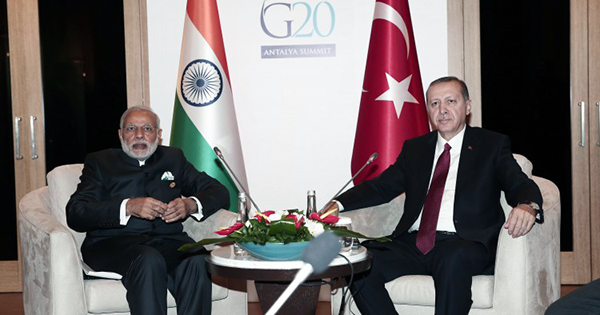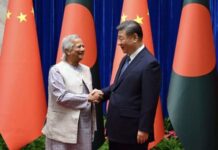
Much like the game ‘invented’ by the young boy brought along by Roy Bland for his secret meeting with George Smiley in le Carré’s iconic work, Turkey’s near-unchecked geopolitical adventurism has encouraged it to raise the stakes of its activities – regardless of the obvious risks posed to itself by such recklessness.
The 2010s saw Turkey undertake concerted efforts to expand its geopolitical influence, both within its immediate neighbourhood of the MENA region and beyond. Yet even as Ankara’s current economic fortunes indicate otherwise, her political and military actions continue to gain visibility, signalling Turkish President Erdogan’s continued intent to grow her security presence far beyond the Middle East. Perhaps, nowhere is this more evident than within the Indian subcontinent. India, for most part, has not shared any geopolitical grievances of note against Turkey over the course our history as a free nation. Yet Turkey’s ambitions, and determination to be recognised as a global power, has led President Erdogan to present Turkish security interests within the subcontinent and beyond as antagonistic to India’s. Identifying, strategising on, and countering this hostile presence is, therefore, essential for India’s national security interests.
Challenge 1: The Afghan Theatre
Over the past year, Turkey has sought to expand its influence within Afghanistan in the context of the US withdrawal. Ankara’s specific interest in Afghanistan thus far seems to be in securing Kabul airport. In July 2021, just a month before the fall of Kabul, Erdogan offered to send Turkish private military and security personnel to secure Kabul airport – only backtracking following a rebuke from the Taliban warning of “dire consequences”. Yet Turkey has retained its interest in Afghanistan, securing a deal in December 2021 with the Taliban regime to run airports in Kabul and across the rest of Afghanistan in partnership with Qatari firms.
The national security implications of this deal for India remain substantial. The December 2021 deal not only reiterates continued intention of operating as a key stakeholder in the Afghan geopolitical theatre, but also demonstrates Ankara’s links with key Taliban factions. Moreover, Turkey’s economic control over Afghan airports may translate into political control, cementing its control over all ports of entry in and out of that landlocked country. India must bear this last factor in mind when framing future HUMINT and diplomatic operations within Taliban-occupied Afghanistan, and exfiltrating ground assets.
At a diplomatic level, a Turkish presence in Afghanistan also blocks India’s outreach to Central Asia. In recent years, Turkey has sought to expand its influence into Central Asia as demonstrated by its leadership of the Turkic Council. A solidified Turkish presence in Afghanistan may be used by Ankara as leverage over the bloc’s other member-states to hamper India’s security and geostrategic interests in Afghanistan. These concerns remain particularly valid at a time when India has actively stepped up its engagement with Central Asia in coordination with its Afghan strategy, as illustrated by the December 2021 meeting in New Delhi between PM Modi, NSA Doval and the foreign ministers of five Central Asian states- four of whom represented member-states of the Turkic Council. Indeed, the meeting may signal South Block’s acknowledgment of this possibility, as well as its national security implications for India. India’s approach to Central Asia in general and Taliban-occupied Afghanistan cannot be divorced from the looming regional threat posed by Turkish belligerence. South Block will need to continue monitoring the extent of Turkish influence over the foreign policies of the Central Asian states, and devise policy accordingly- as it already seems to be doing.
Challenge 2: The China Connection
As highlighted previously, Turkey’s belligerence within its neighbourhood and beyond has taken a toll on its economy, leaving it vulnerable to foreign manipulation and leverage. The past decade has seen the Turkish economy struggle under the weight of its adventurism, leaving it susceptible to Chinese control. Tensions do remain – such as the Uyghur question, and the economic competition engendered with China due to Erdogan’s push for economic influence in Central Asia. However, China has exploited the Turkish economy’s weaknesses by rapidly expanding its BRI projects within the country over the past decade. In recent years, China’s economic influence has become increasingly visible in Turkey, from Chinese companies owning majority stakes in key Turkish infrastructure and business projects and to the Chinese construction of Turkey’s 5G infrastructure.
The primary threat posed to India by this encroaching Chinese control over Turkey’s sluggish economy is the potential exacerbation of Ankara’s belligerence against India under Chinese influence. Turkey’s growing hostility to the Indian stance on the issue of Kashmir increasingly coincides with China’s – and with Beijing’s vast economic leverage over China, the Turkey-China axis could pose serious security challenges to India within Kashmir in the future. Additionally, this Chinese influence could be used to heighten Turkish opposition to Indian interests within global for a like the UN, including on critical issues such as India’s entry into the Nuclear Suppliers Group and influence within UN committees.
Challenge 3: Support for political extremism within India
Another security challenge posed to India by Turkey is its support of banned domestic terrorist outfits within India. Turkey’s funding of key domestic. extremist outfits through front organisations such as IHH –- most notably its links to the PFI – constitute a significant breach of India’s sovereignty, and demonstrate Turkey’s geopolitical adventurism within the subcontinent. This is a threat compounded by Turkey’s vast militant and intelligence networks in neighbouring states such as Nepal, aimed directly at fomenting terror and political instability within India.
Solution 1: Targeting the money trail via organised crime
Countering Ankara’s malign activities against India necessitates a recognition of the close links between transnational Turkish organised crime syndicates and the MIT- Turkey’s foreign intelligence services. Turkish organised crime, operating primarily out of Western European capitals, essentially serves as an extension of Turkish foreign policy interests- as the revelations by former Turkish mafia boss Sedat Peker have highlighted. Indeed, Peker’s revelations surrounding the MIT’s use of Turkish organised crime syndicates to funnel arms to al-Nusra in Syria, as well as the close links between AKP figures (including officials in the Foreign Ministry) and noted Turkish mafia figures abroad underscore the crime-intelligence nexus characterising Turkish security policy under Erdogan. Moreover, it demonstrates the centrality of these diasporic organised crime networks as a source of funding for Turkey’s offensive activities overseas – including in India, through support to extremist organisations and the establishment of centres of influence in Afghanistan, where India continues maintaining security interests.
As such, combatting Turkey’s malign activities against India requires a focus on the money trail, and specifically the role of Turkish diasporic criminal networks in this respect. Hence, identifying and targeting the activities of Turkish organised crime – both within India and elsewhere needs to take centre stage in New Delhi’s defensive strategy. This will require, among other factors, the provision of new mandates to Indian intelligence networks in Western Europe and the MENA region, and an expanded understanding of the threat posed by Turkish organised crime to Indian security interests.
Solution 2: Surreptitious Economic Control
Turkey’s economic woes have left it vulnerable to exploitation by foreign powers- most visibly that of China. However, opportunity still exists for India to use its comparative economic heft to acquire leverage over Ankara and hopefully help put an end to its nefarious activities. Turkey’s recent introduction of a ‘citizenship by investment’ regulation provides India with an opportunity to deepen its economic influence within Turkey, and hopefully utilise this influence to press the Turkish state to cease its anti-India activities.
Solution 3: The creation of a Middle Eastern Axis
Tackling Turkey’s anti-India activities will also require the MEA to step up India’s engagement with key Middle Eastern powers at a strategic level, and through military and intelligence cooperation.
Turkey’s belligerent attitude within the MENA region has isolated it among most of its fellow regional powers. Turkey is currently locked in a series of proxy wars with Saudi Arabia and the UAE, ranging from Libya to Syria and increasingly, a battle for political influence in Lebanon. Ankara similarly shares an acrimonious relationship with Abdel Fattah el-Sisi’s Egypt, under whose leadership Egypt has seen a crackdown on the Turkish-backed Muslim Brotherhood within the country. Israel continues to remain vexed by Turkey’s support for Palestinian militant groups, despite its occasional cooperation with Ankara in non-regional conflicts such as the 2020 Nagorno-Karabakh War. And Turkey continues to share a complex yet tense relationship with Iran, finding itself often operating on the opposite side of the fence through their proxies in the Syrian Civil War despite their common concerns surrounding Kurdish nationalism.
Unlike Turkey, however, India has maintained consistently positive relations with all these competing Middle Eastern powers. The creation of a Middle Eastern alliance, formal or otherwise, aimed at keeping a check on Turkish influence would therefore serve India’s interests in defending against Turkish belligerence. Indeed, India may use her image as a neutral arbitrator to increasingly position herself as a mediator within various Middle Eastern conflicts, simultaneously providing New Delhi with the opportunity to string together an alliance between like-minded nations to counter Turkish aggression. Such an alliance also leads into the first solution of tracking the money trail, as expanded intelligence cooperation between India and Middle Eastern powers such as Saudi Arabia, the UAE, Israel and Egypt provide policymakers in South Block with a better understanding of Turkish financial operations and their potential links to Ankara’s belligerence within the Indian subcontinent. It would also help maintain a lid on the establishment of Turkish centres of power across the region, which may hold future potential for anti-India activities on Ankara’s part.
In summary, India does not seek a poor relationship with Turkey. Yet as MI6 Chief Richard Moore recently noted during his speech at the IISS, policymakers are supposed to “deal with the world as it is, not the way they would like it to be”. Turkey’s unprovoked aggression towards India is unfortunate, yet undoubtedly merits a response. Synergising our military, intelligence and economic capabilities in this respect is, therefore, fundamental to India’s long-term security interests, allowing us to rid the subcontinent of hostile influence and negotiate with Turkey on equal terms.

















